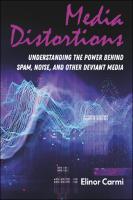Media Distortions
Understanding the Power Behind Spam, Noise, and Other Deviant Media
Abstract
Media Distortions is about the power behind the production of deviant media categories. It shows the politics behind categories we take for granted such as spam and noise, and what it means to our broader understanding of, and engagement with media. The book synthesizes media theory, sound studies, science and technology studies (STS), feminist technoscience, and software studies into a new composition to explore media power. Media Distortions argues that using sound as a conceptual framework is more useful due to its ability to cross boundaries and strategically move between multiple spaces—which is essential for multi-layered mediated spaces. Drawing on repositories of legal, technical and archival sources, the book amplifies three stories about the construction and negotiation of the ‘deviant’ in media. The book starts in the early 20th century with Bell Telephone’s production of noise, tuning into the training of their telephone operators and their involvement with the Noise Abatement Commission in New York City. The next story jumps several decades to the early 2000s focusing on web metric standardization in the European Union and shows how the digital advertising industry constructed web-cookies as legitimate communication while making spam illegal. The final story focuses on the recent decade and the way Facebook filters out antisocial behaviors to engineer a sociality that produces more value. These stories show how deviant categories re-draw boundaries between human and non-human, public and private spaces, and importantly, social and antisocial.
Keywords
Media studiesDOI
10.3726/b15334Publisher website
https://www.peterlang.com/Publication date and place
Bern, 2020Series
Digital Formations, 121Classification
Media studies


 Download
Download